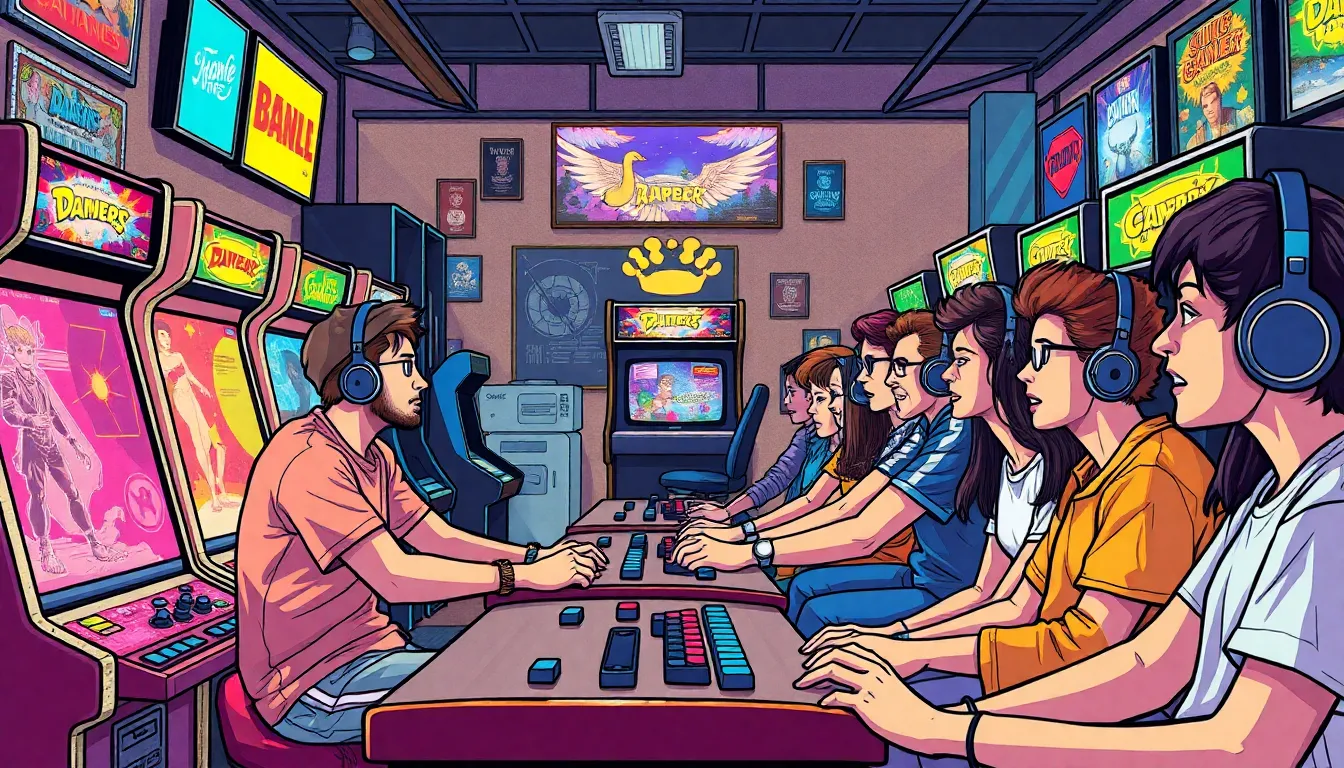
Gamer Culture: How It Evolved into a Thriving Community and Influential Force
In a world where avatars reign supreme and high scores are the new currency, gamer culture has exploded into a vibrant phenomenon that transcends mere entertainment. It’s a realm where strategy meets creativity, and where friendships are forged over epic battles and late-night raids. From the casual player to the hardcore enthusiast, this culture unites millions under a shared passion for gaming.
Gamer Culture
Gamer culture represents a dynamic community that extends far beyond entertainment. This phenomenon unites casual gamers, competitive players, and dedicated enthusiasts through shared interests. It thrives on strategic thinking, creativity, and collaboration, resulting in unique social bonding experiences.
Gaming conventions attract thousands of fans annually. Events like E3 and PAX showcase industry advancements and host tournaments, celebrating various gaming genres. Participants engage in discussions and connect over mutual passions, fostering relationships that transcend physical and digital spaces.
Online platforms enhance networking opportunities. Services like Discord allow players to form communities based on specific games or interests. These platforms enable livestreaming, sharing gameplay highlights, and participating in esports, showcasing the competitive side of gamer culture.
Diverse genres enrich the culture. These categories include role-playing games (RPGs), first-person shooters (FPS), and massive multiplayer online games (MMOs). Each genre offers unique gameplay experiences, attracting different player demographics.
Social impact grows alongside gaming trends. Gamers advocate for inclusivity, mental health awareness, and representation within the industry. Discussions surrounding issues like toxic behavior and diversity contribute to a more supportive environment.
Gaming influencers shape the culture significantly. Popular streamers and content creators inspire millions by sharing strategies, reviews, and entertaining content. Their influence often sways popular opinions and game preferences across the community.
Through various channels, gamer culture continues to evolve, continually adapting to new technologies and trends. By embracing inclusivity and creative expression, this culture cultivates an ever-expanding landscape for gamers worldwide.
Historical Background

Gamer culture has deep roots, evolving from early communities to a global phenomenon. This transformation has shaped the social dynamics surrounding gaming.
Early Gaming Communities
Early gaming communities emerged in the late 1970s and early 1980s, uniting players through local arcades and home consoles. Multiplayer experiences allowed friends to connect, fostering competition and collaboration. Bulletin board systems became popular, enabling players to share high scores and strategies. These platforms often included forums, attracting gamers who sought tips and camaraderie. As gaming magazines gained traction, they provided insights into game strategies and industry news, building a knowledgeable player base. Such interactions laid the foundation for the vibrant networks seen today, emphasizing community bonds within the gaming ecosystem.
Evolution of Video Games
The evolution of video games accelerated in the 1990s with the rise of 3D graphics and online connectivity. Iconic consoles like the PlayStation and Nintendo 64 revolutionized gameplay, increasing accessibility. PCs became gaming powerhouses, offering complex experiences and online multiplayer functionality. Game genres diversified, introducing RPGs, FPS, and simulation games that catered to varying interests. The introduction of esports in the early 2000s formalized competitive gaming, creating professional leagues and tournaments. Platforms like Twitch enabled live streaming, enhancing player engagement and audience involvement. These developments collectively contributed to the growing recognition of gaming as a legitimate cultural force.
Key Elements of Gamer Culture
Gamer culture thrives on various elements that contribute to its vibrant ecosystem. Unified by shared experiences, players engage in a multitude of gaming genres and foster social connections through online communities.
Gaming Genres and Preferences
Diving into gaming genres reveals diverse interests among players. Role-playing games (RPGs), first-person shooters (FPS), and massively multiplayer online games (MMOs) encompass the spectrum. Preferences often shape community dynamics, with each genre attracting unique demographics. RPGs appeal to those who enjoy storytelling and character development. FPS games attract competitive individuals, emphasizing skill and strategy in fast-paced environments. MMOs foster expansive social networks, allowing players to collaborate on quests and form guilds. Genre diversity enriches overall gaming culture, making it inclusive for all gamers.
Online Communities and Social Interaction
Online communities enhance social interactions within gamer culture. Platforms like Discord and Twitch serve as hubs for communication and collaboration. Players join channels centered on specific games, sharing strategies and fostering friendships. These communities cultivate inclusivity, promoting discussions on topics like inclusivity and mental health. Streaming services further connect gamers, allowing them to watch and engage with content creators in real time. Group events such as tournaments exemplify collaboration, uniting players for friendly competition. Overall, online spaces significantly impact the sense of belonging among gamers.
Influences on Gamer Culture
Gamer culture thrives on various influences that shape its identity and direction. Two of the most significant influences are technology and media representation.
Technology and Gaming Hardware
Advancements in technology fuel gamer culture, shaping gameplay experiences. Enhanced graphics improve immersion, allowing players to lose themselves in richly detailed worlds. Gaming hardware, such as powerful consoles and high-performance PCs, encourages competitive play and creativity. Virtual reality platforms introduce new ways for players to interact, bringing them closer to the gaming experience. Innovations in accessories, like specialized controllers and headsets, enhance gameplay mechanics and foster communication. Overall, technology not only influences gaming performance but also expands the potential for community interactions.
Media Representation of Gamers
Media representation profoundly impacts gamer culture, shaping societal perceptions. Increasingly, films and television series incorporate gaming narratives, highlighting diverse gamer experiences. Popular content creators on platforms like YouTube and Twitch showcase gaming skills, inspiring aspiring gamers to join the community. Positive portrayals of gamers break stereotypes, making the culture more relatable to broader audiences. Additionally, representation fosters inclusivity by showcasing women and minorities in gaming, contributing to a more diverse outlook. As media continues to evolve, its portrayal of gaming influences public attitudes and attracts new players.
Challenges Within Gamer Culture
Gamer culture faces various challenges, impacting the community’s growth and inclusivity.
Toxicity and Harassment
Toxic behavior poses significant issues within gaming communities. Many players encounter harassment during gameplay, especially in competitive settings. Gamers often experience hate speech or targeted bullying, which detracts from the gaming experience. Toxicity not only affects mental health but also discourages new players from joining communities. Game developers seek to address these problems through reporting tools and community guidelines. Efforts include promoting positive conduct within gaming platforms, emphasizing respect and support among players. Many influencers advocate against toxicity, urging gamers to create welcoming environments.
Inclusivity and Diversity Issues
Inclusivity remains a critical concern in gamer culture. Diverse representations in games influence player engagement and community growth. Female gamers and players of color often face systemic barriers and exclusion. Addressing these issues fosters a safer and more welcoming environment for all. Industry representatives work to increase visibility through character diversity and inclusive storylines. Moreover, initiatives aimed at promoting female and minority participation help break down stereotypes. Events focusing on underrepresented groups encourage dialogue and celebrate diversity, enriching the gaming experience for everyone.
The Future of Gamer Culture
Technological advancements will significantly shape the future of gamer culture. The integration of augmented reality (AR) and virtual reality (VR) will enhance immersive experiences, allowing players to interact with their environments in ways never seen before. Innovations in cloud gaming will also remove hardware limitations, granting access to high-quality gaming on various devices.
Esports continues to gain traction, with more viewers and participants each year. Increased media coverage and sponsorship deals provide a platform for players to showcase their skills. Major tournaments draw in thousands of live attendees and millions of online viewers, highlighting the competitive spirit within gamer culture.
Inclusivity and representation will play a pivotal role in shaping future communities. Initiatives promoting diversity seek to address historical disparities and foster participation among underrepresented groups. Gaming companies are actively working to create welcoming environments that encourage diverse voices in both game development and player engagement.
Mental health awareness efforts will gain importance as gaming becomes a more integral part of social interaction. Advocates are pushing for resources and support systems that prioritize players’ well-being. Greater focus on these topics will help create healthier communities.
New genres and gameplay styles are emerging, reflecting changing player preferences. Genres like narrative-driven adventures and cooperative multiplayer experiences cater to varying interests and promote collaboration. The diversification of games will ensure that gamer culture remains vibrant and engaging.
Ultimately, the evolution of gamer culture hinges on community collaboration. Online platforms will continue to serve as essential spaces for discussion, enabling gamers to share experiences and ideas. Together, these factors will contribute to an evolving landscape that maintains its core values of creativity, connection, and inclusivity.
Conclusion
Gamer culture stands as a testament to the power of community in the digital age. As it continues to evolve through technological advancements and diverse player engagement, it fosters connections that transcend geographical boundaries. The commitment to inclusivity and mental health awareness will shape its future, ensuring that gaming remains a welcoming space for all.
With the rise of esports and innovative gameplay styles, the culture is poised for further growth. The ongoing dialogue around representation and collaboration will keep the gaming community vibrant and dynamic. As players unite over their shared passions, they not only enhance their gaming experiences but also contribute to a broader cultural narrative that celebrates creativity and connection.
